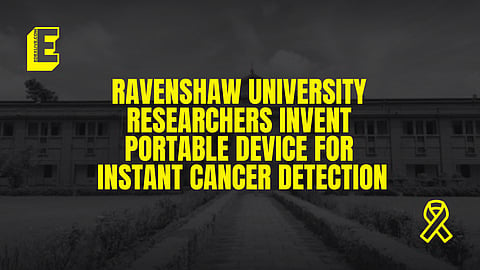

A group of researchers from Ravenshaw University have invented a unique diagnostic device that could revolutionise cancer detection in the country. The portable device can detect cancer instantly using microfluidics and biosensor technology.
The patent office of the Union government has recently issued the design patent for the portable cancer diagnostic device to a team of seven researchers led by the head of the Zoology department Prof Luna Samanta, The New Indian Express reports. The device features a user-friendly touchscreen display that guides users through the sample collection and analysis process. It has a simple and secure port for inserting samples, compatible with various bodily fluids.
Soumya Ranjan Jena, a postdoctoral researcher, told The New Indian Express that though there are several techniques of cancer detection, sometimes the diagnosis gets delayed or the patient has to undergo a lot of trouble during the process.
“Since traditional diagnostic methods often require sophisticated equipment, and specialised laboratories, and are not readily accessible to everyone, especially to those residing in remote areas, there is a pressing need for more accessible, efficient, and accurate methods for early disease detection, particularly for conditions like cancer. Our device will detect cancer instantly from a minimum quantity of body fluids like blood,” he said.
Designed for portability, the device is small enough to be handheld, making it easy to transport and use anywhere. Integrated microfluidic channels are used in the device for precise examination of small blood samples. Advanced bio-sensors that are sensitive to specific cancer bio-markers and employ various detection methods like electrochemical, optical, and acoustic sensing will help diagnose the disease.
The device can be used in areas without direct power sources. Users can collect a small blood sample and insert it on a chip into the device. The micro-fluidic channels within the device will accurately assess the sample and the bio-sensors detect specific proteins or DNA mutations associated with different types of cancer. It also enables transmission of data to healthcare providers for analysis and consultation, said Jena.
The researchers told The New Indian Express the device that offers new possibilities for early detection, continuous monitoring, and personalised treatment strategies is at technology readiness and they are in the process of collaborating with an industry partner for manufacturing the device. The clinical trials will be conducted in the next phase and after a validation of the device at the laboratory level, it will be launched for commercial use, said Prof Samanta.
